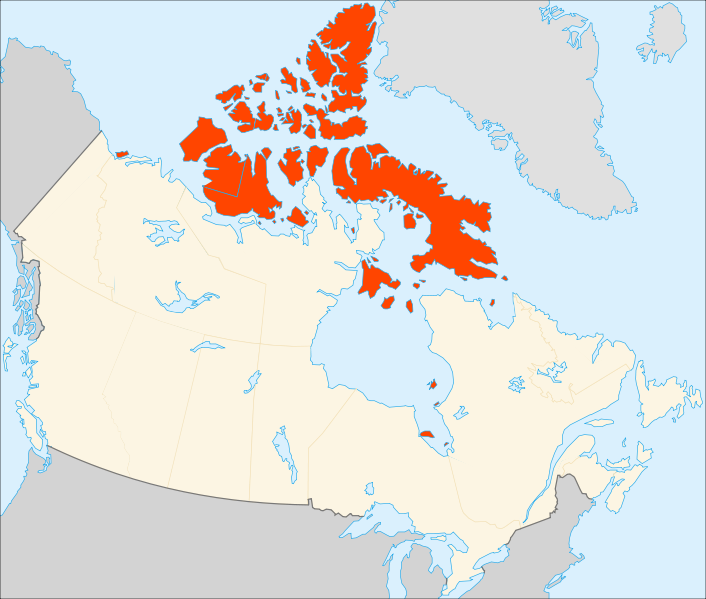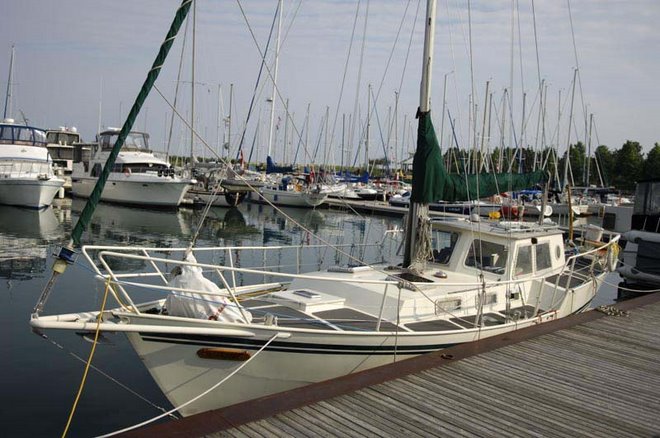 |
| An uncharted hazard to navigation, but keeps the rum cool |
http://www.cbc.ca/news/canada/story/2012/08/29/north-northwest-passage-sailors.html
http://www.ctvnews.ca/canada/sailors-take-northernmost-trek-through-arctic-to-highlight-record-thaw-1.937299
While it's not quite the first it's suggested to be, St. Roch and Gjøa having done it before and over a protraced (years!) period...
 |
| Gjøa: Norwegian for "damn, it's chilly on this deck" |
 |
| St. Roch: Were the Mounties not particularly busy during WWII? |
...along with a number of powered vessels since, the achievement, in the context of the High Arctic route and the smallness of the vessel, is singular.
Consider that in the '70s the seemingly forgotten Willy de Roos did it in a nearly 50-foot steel sailboat especially constructed for the trip, for instance. This makes taking even a modified production boat of some age more unusual.
 |
| Note the ice-chopper welded to the bow. Now I want one. |
The 31-foot boat and the owner are Swedish, and the two crew Canadian. No sailboat has evidently been farther north. It was not generally considered possible before the hotter, more lightly iced Arctic summers of late. The voyage was proposed as a way to raise awareness of climate change, and I suppose it's done that, all right. There's plenty of interesting, both to me as a Canadian with knowledge of high-latitude exploration and as the fitter-out of an "expedition"-grade steel sailboat, at the voyage's website here.
 |
| Full keeled like the steel Alchemy, but shorter than, almost as old as, and plastic like, Valiente |
It's undeniably stirring stuff, as opposed to deniable climate science. I have to wonder, however, given my generally dubious take on man and his works, if eyes aren't lighting up in the financial capitals of the world with fresh avarice, thinking "well, if a crappy little sailboat can do this trip...". One of the conceptual barriers to the usual attitude of "go forth and suck" in the Canadian Arctic is that the history is very discouraging.
 |
| Holy frozen crap. |
In a case of interesting timing, the same week a little Swedish civilian pleasure vessel did what killed literally hundreds of the best-equipped Europeans of the last century, Canada's fearless leader announced a drive to find Franklin's sunken and presumably crushed ships. More cheap sentiment with a varnish of science, perhaps, but it is a rationale for sounding the frosty and probably clathrate-littered Arctic depths to bolster our territorial claims to the vastness. Bannock bread and Arctic circuses aside, it's going to lead to better charts. I support, broadly, better charts. Whether I personally visit the place or not, when a deep-draft oil tanker chugs through those particular dark waters, I would desire an outcome that doesn't involve the extremely limited Canadian SAR resources in the Arctic.
Canada considers the convoluted and incompletely charted seas of its Arctic Archipelago to be essentially domestic/coastal waters, like the waters between Vancouver Island and the mainland of British Columbia. Other countries, including the United States, China and Russia, all of whom have tankers capable of ice-breaking, think the waters "international". In effect, if a tanker breaks up off King William Island and befouls thousands of square miles of fragile Arctic coastline, too bad for Canada: it's nobody's fault. Bad stuff happens at sea, right?
 |
| Not actually Canada for the purposes of shipping/resource extraction |
So while I can appreciate the planning, seamanship, raw energy and sheer bravado of the crew of Belzebub II, I cannot help but see the achievement as another nail in the coffin of Canada's Arctic territorial sovereignty, of which I am not particularly concerned, but also as a start flag waved in the cause of the industrialization of the Arctic, of which I am mightly concerned.
Pack ice freeing up for slightly longer each late summer is not necessarily an opportunity. The Arctic should remain a daunting and hostile environment for industrial endeavour for the foreseeable future, and because we can do it (see "moon landings"), it doesn't follow that we should do it (no "moon colonies and factories 40 years on").
 |
| Who farted? |
I find it interesting that some of the same governments that are denying a human role in climate change (China, Russia, the U.S.) are chomping at the bit to extract resources from an area, such as the Canadian Arctic, that has been historically unavailable due to it being too damn cold and icy. And dark. And without nav aids, or, on occasion, reliable compass readings.
Naturally, the paradox of a warming Arctic caused by (possibly and/or in part) human-driven climate change leading to fossil-fuel and mineral extraction that will lead to more cars and gas and coal and smelting, which in turn will...
Well, gentle reader, I sincerely hope the point is taken: The world is run on partial perceptions best appreciated through one eye. The eyelid is lubricated with grease.
Denialism in climate terms is, I believe, multi-part: Denialists have found (and a good thing, too) examples of climate science that is either inconclusive or actually rigged. This leads to ideas that the whole topic is a way to garner grants and to drive social change and "socialist" schemes like carbon taxes.
The climate scientist community has not been well-served here. Fiddling with the numbers or stating that a consensus exists when such is not the case does make the neurons of conspiracy theory light up. Egregious tampering has been uncovered. This does not render the AGW thesis incorrect, but the degree, timing and mix of causes leading to AGW, along with a predictable timeline worth pondering, is rendered, once again, foggy. Planetary climate trends rest on so many variable that it is extremely hazardous, in my view, to make blanket, or smog blanket, predictions of future trends.
The other aspect of denialism, however, is harder to challenge, but perhaps easier to understand, and that is the problem of scale. Understanding how one's driving of a SUV or one's dark grey shingles or gas-heated corn-to-ethanol conversion plants can add up to climate tipping points (shaped or not shaped like hockey sticks as required) is very difficult for individual humans to understand, like accepting that our bodies are composed of ten times as many bacteria as body cells. To consider this is firstly difficult for the generally innumerate citizenry of most of the planet, but also because it is disturbing to do so.
Having a direct understanding of what one's car, furnace, international road transport system, international bunker-diesel shipping fleets, and tens of thousands of dirty coal plants is hard for most people to conceive. Understanding that such sources are cumulative in their output of certain gases and particulates is less difficult to understand, so we are fighting about matters of degree.
The weather is always changing. The climate is the cumulation of the weather. To sail an old, plastic 31 footer through the top end of the Northwest Passage would have seemed inconceivable within my own lifetime. Now it has been done. Something is changing. Whether it represents whether something is amiss or whether we have a large or small part in it is still not fully understood. I have even heard that without the Industrial Revolution, the timing of various orbital cycles might have seen by this point the start of a fresh Ice Age, but even those take centuries to boot up.
Frankly, I suspect that our numbers will kill us collectively before the climate does. Insects moving north and south with drought in food producing areas, and habitat decline on the coasts may revive old diseases or invent new ones. History is replete with examples where humans, even rich, savvy ones, have been quite easily killed off by the most common of climatic events. A less-populated Earth would buy more time, I think, to try and figure out exactly what is happening, our part in it, and whether we have any options in the matter.
The most fascinating part of this latest Nortwest Passage is that they went in a fibreglass boat and not a steel one. That to me says more about the conditions they encountered...and anticipated encountering... then multiple shots of them tanning at 70 degrees north to the sound of melting ice pans, like it was some kind of fortuitous miracle of surprising warmth.
 |
| These guys did it in the '80s a lot farther south and it was no picnic. Before them: Hudson. If you can find this, it's a very good read, and I have been on this boat and knew the voyagers |
Even though with only minimal changes in our refitting plans, I could equip Alchemy for high-altitude work, I'm not sure if I want to be part of that problem. I'm not sure I'm part of the solution, however, by not transiting the Northwest Passage, even if it is now, unlike in the time of Franklin, less an impossible dream.
Lastly, this post is an excuse to play one of my favourite Canadian songs.




